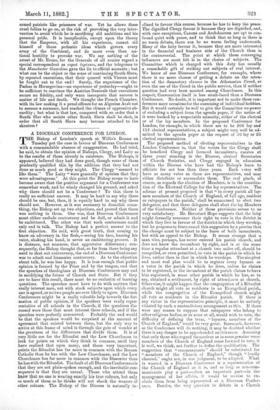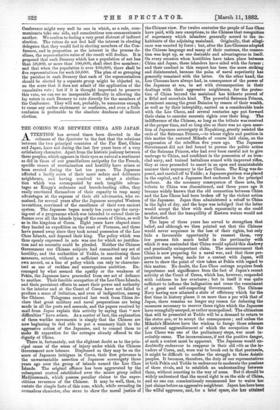A DIOCESAN CONFERENCE FOR LONDON.
THE Bishop of London's speech at Willis's Rooms on Tuesday put the case in favour of Diocesan Conferences with a commendable absence of exaggeration. He had tried, he said, to obtain the opinion of Bishops, Clergy, and Laity as to the results of those already in existence. The Bishops, it appeared, believed they had done good, though some of them prudently qualified this by the addition that they had not done as much good as they might. The Clergy " seemed to like them." The Laity " were generally of opinion that they were advantageous." At this point the Bishop seems to have become aware that the positive argument for a Conference was somewhat weak, and he wisely changed his ground, and asked why there should not be a Conference ? To this, there is really no sufficient answer. It may be hard to say why there should be one, but, then, it is equally hard to say why there should not. However, as it was necessary to demolish some- thing, the Bishop set up two objections, and proved that there was nothing in them. One was, that Diocesan Conferences must either exclude controversy and be dull, or admit it and be embittered. The other was that such conferences could only end in talk. The Bishop had a perfect answer to the first objection. He said, with great truth, that coming to know an adversary in the flesh,— seeing his face, hearing his voice, shaking his hand, is never an embittering process. It is distance, not nearness, that aggravates differences ; con- sequently, the Bishop thought that, so far from there being any need to shut out controversy, the end of a Diocesan Conference was to admit and humanise controversy. As to the objection about talk, he was less happy. It is true enough that public opinion is formed by the Press and by the tongue, and that the speeches of theologians at Diocesan Conferences may end in modifying the future of Church and State. But if they are to have this result, there must be no exclusion of burning questions. The speeches must have to do with matters that really interest men, not with stock subjects upon which every one is agreed, or no two people are ever likely to agree. Diocesan Conferences might be a really valuable help towards the for- mation of public opinion, if the speakers were really repre- sentative of all schools in the Church, if the questions dis- cussed were those that most interest these schools, and if the speeches were perfectly unreserved. Probably the end would be that the speakers would be surprised at the amount of agreement that existed between them, but the only way to arrive at this frame of mind is through the gate of wonder at the greatness of the differences that divide them. It is of _very little use for the Ritualist and the Low Churchman to look for points on which they think in common, until they have realised that upon many, and those very important, points the Ritualist has far more in common with the Roman Catholic than he has with the Low Churchman, and the Low Churchman has far more in common with the Dissenter than he has with the Ritualist. The fault of all Diocesan Conferences is that they are not plain-spoken enough, and the inevitable con- sequence is that they are unreal. Those who attend them know that no one is wearing exactly his true colours, but only so much of them as he thinks will not shock the wearers of other colours. The Bishop of the Diocese is naturally in-
dined to favour this course, because he has to keep the peace. The dignified Clergy favour it because they are dignified, and, with rare exceptions, Canons and Archdeacons are apt to con,. found quiet with peace, and to think that so long as there is no warm debate, there can be no warm feeling underneath_ Many of the laity favour it, because they are more interested in the financial and business side of the Church than in the controversial. The point at which these converging influences are most felt is in the choice of subjects. The Committee which is charged with this duty has usually a remarkable gift of striking out subjects of real interest- We know of one Diocesan Conference, for example, where there is no more chance of getting a debate on the reten- tion of the damnatory clauses in the Athanasian Creed,.or even the use of the Creed in the public service, than if neither question had ever been mooted among Churchmen. In this- respect, Convocation itself is less strait-laced than a Diocesan Conference. No doubt, it is important not to make these con- ferences mere occasions for the exercising of individual hobbies. But it would certainly be well to give the Committee no power of excluding a subject from the agenda paper, if the notice of it were backed by a respectable minority, either of the clerical or of the lay members. In the proposed Conference for London, for example, in which there are to be 206 lay and 112 clerical representatives, a subject might very well be ad- mitted to the agenda paper at the request of 50 lay or 25 clerical representatives.
The proposed method of electing representatives to the London Conference is, that the voters for the Clergy shall be beneficed Clergy and licenced incumbents, curates of three years' standing in the Diocese, clerical Secretaries of Church Societies, and Clergy engaged in education within the Diocese who have had the Bishop's leave to officiate for not less than three years. Each voter will have as many votes as there are representatives, and may either distribute or accumulate them. The real pinch, of course, as regards the election of Members, is in the constitu- tion of the Electoral College for the lay representatives. The scheme at present proposed is that " in every parish all lay- men members of the Church of England, of full age, resident or ratepayers in the parish," shall be summoned to elect two delegates, and that these delegates shall elect the lay Members of the Conference. Neither of these provisions seems to us very satisfactory. Mr. Beresford Hope suggests that the laity might formally renounce their right to vote in the district in which they live in favour of the district in which they worship, but he proposes to fence round this suggestion by a proviso that the change must be subject to the leave of both incumbents, but with an appeal to the Bishop. It seems strange that a man who, perhaps, has never entered his parish church, and does not know the incumbent by sight, and is at the same time a regular attendant at a church two miles off, should be compelled, or even permitted, to vote in the parish in which he lives, rather than in that in which he worships. The simplest and most real plan would be to register every layman as a voter in the parish in which he lives, unless he claims to be registered, or the incumbent of the parish claims to have him registered, in some other parish in which he has, so to say, obtained a settlement, by right of attendance at church. Otherwise, it might happen that the congregation of i, Ritualist church might all vote as residents in an Evangelical parish, while the congregation of the Evangelical church might all vote as residents in the Ritualist parish. If there is any virtue in the representative principle, it must be entirely vitiated by such a contradictory arrangement as this. If there were any reason to suppose that ratepayers who belong to other religious bodies, or to none at all, would wish to vote, the difficulty of defining the term, " laymen, members of the Church of England," would be very great. Inasmuch, however,
as the Conference will do nothing, it may be doubted whether there is any danger to be apprehended on this score. Assuming that only those who regard themselves as in some genuine sense members of the Church of England come forward to vote, it is well, we think, not further to define the qualification. The suggestion that " communicants " should be substituted for " members of the Church of England," though " loudly cheered," ought not, in our judgment, to be adopted. What is wanted in a Diocesan Conference is a representation of the Church of England as it is, and so long as non-com- municants play a part—often an important part—in the management of her affairs, it would be unwise to ex- clude them from being represented at a Diocesan Confer- ence. Besides, the very question in debate in a Church Conference might very well be one in which, as a rule, com- municants take one side, and conscientious non-communicants another. We confess to feeling a very great distrust of indirect election. The voters do not feel half the interest in electing delegates that they would feel in electing members of the Con- ference, and in proportion as the interest in the process de- clines, the representative value of the result will decline. It is proposed that each Deanery which has a population of not less than 50,000, or more than 100,000, shall elect five members ; and that when the population is over 100,000, there shall be five representatives for each 50,000. The plan of so grouping the parishes in each Deanery that each of the representatives should be elected by a separate group might be objected to, on the score that it does not admit of the application of the cumulative vote ; but if it is thought important to preserve this vote, we can see no insuperable difficulty in allowing the lay voters in each Deanery to vote directly for the members of the Conference. They will not, probably, be numerous enough to cause any undue excitement or confusion, and even a little confusion is preferable to the absolute deadness of indirect election.



































 Previous page
Previous page